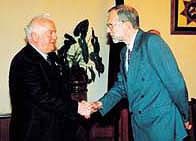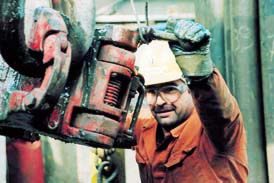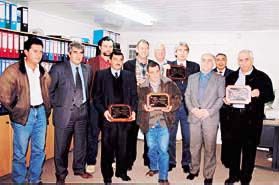|

Spring
1999 (7.1)
Pages
101-102
AIOC:
Current
Developments
by Tamam
Bayatly
AIOC President's
Visit to Georgia
 AIOC President David
Woodward visited Georgia in late February to see firsthand the
current status of activities related to the Georgian section
of the AIOC President David
Woodward visited Georgia in late February to see firsthand the
current status of activities related to the Georgian section
of the  Western
Route Export Pipeline (WREP) and the terminal at Supsa on the
eve of the full operation of the pipeline system. Western
Route Export Pipeline (WREP) and the terminal at Supsa on the
eve of the full operation of the pipeline system.
During his three-day trip, Woodward met with President Shevardnadze,
updating him on AIOC's production progress from the Chirag platform.
Woodward advised President Shevardnadze that the first tanker
loading could begin in March. Woodward said he was looking forward
to the inauguration of the WREP, which should be a celebration
for the people and the governments of both Azerbaijan and Georgia.
Photo:
AIOC's president,
David Woodward, met Georgia's President Shevardnadze in regard
to the Western Route Export Pipeline.
AIOC In 1999
AIOC's
first year of Early Oil production from the Chirag platform was
very successful, exceeding 1998 projections. Now the company
is working toward another successful year in an attempt to build
a record of success that will encourage new investment from shareholders.
However, the company will have to reduce its operating costs
to meet the challenge of low oil prices. AIOC activities this
year will be aimed at maximizing returns to its investors by
delivering each barrel of crude oil to international markets
at the lowest-possible price.
Accident-Free
AIOC's
principal contractors and company employees working on the Azerbaijan
section of the Western Route Export Pipeline (WREP) began 1999
with an achievement of 3 million man-hours without any lost time
incident. Management contractor Kvaerner presented commemorative
plaques to Azfen, Tekfen, Petrofac and AIOC at the project camp
in Kurdamir in late January in recognition of this outstanding
achievement.
Speaking at the ceremony in Kurdamir, John Hollis, AIOC Vice-President-Oil
Transportation, said, "First Oil in the Western Pipeline
from the Caspian has put us on track to achieve the first tanker
loading in the Black Sea in April 1999. As we focus on the completion
of the project, we fully realize that our first objective is
the safety of our workforce. Safety must be managed with a passion
and practiced on-site with total commitment. Nothing less will
enable us to successfully achieve our final milestone of completing
the 853-km pipeline system, capable of delivering 105,000 barrels
per day, without an accident. It is First Oil and safety is first."
First Oil Reaches
Supsa
The
First Oil that AIOC pumped into the Western Route Export Pipeline
(WREP) from the terminal at Sangachal near Baku on December 10,
1998 reached the newly-built Supsa terminal on the Black Sea
coast of Georgia on March 11, 1999. The oil is now flowing into
the tanks of the Supsa terminal; from there it will be pumped
into the offshore tanker-loading system for its further journey
to world markets.
The loading of the first tanker in Supsa with AIOC oil is now
scheduled to take place at the end of March. The official inauguration
of the Supsa terminal is scheduled for April 17, 1999.
The WREP starts its route at the Sangachal terminal on the Caspian
Sea shore near Baku and finishes at a loading buoy in the Black
Sea linked to the Supsa terminal in Georgia. The 830-km long
WREP extends through Azerbaijan and Georgia and has a throughput
capacity of 105,000 barrels of crude oil per day (5 million tons
per annum). The full operation of the WREP system completes AIOC's
crude oil export strategy for the Early Oil project. At peak
activity, the project employed more than 4,000 people, with Azerbaijani
and Georgian nationals accounting for more than 70 percent of
the workforce.
In 1999, AIOC is planning to maximize the use of the Western
Pipeline through Georgia; however, the company remains committed
to the successful operation of both pipelines-the Northern Pipeline
through Russia to Novorossiysk and the Western Pipeline through
Georgia to Supsa. The flexibility of having two export routes
will improve the reliability and economics of delivering Azerbaijan's
oil to Western markets.
Chirag
 AIOC is currently producing
100,000 barrels of oil per day AIOC is currently producing
100,000 barrels of oil per day  from
eight production wells on the Chirag platform and exporting its
crude via the Baku-Novorossiysk Pipeline, which has been operational
since October 1997. from
eight production wells on the Chirag platform and exporting its
crude via the Baku-Novorossiysk Pipeline, which has been operational
since October 1997.
Photo:
Drilling
operations on AIOC's Chirag platform. February 1999.
Well-11
was spudded late February, and the next production well is expected
to be on stream shortly. AIOC's successful operations on Chirag
have allowed its shareholders to lift three to four tankers from
Novorossiysk per month. To date the total production from the
Chirag platform is more than 3.3 million tons since November
7, 1997, when the company delivered its First Oil.
Production for 1999 is expected to be 14,000 tons per day. As
to future production plans, a major challenge this year will
be to identify an attractive development concept and to move
forward the Full Field Development of the Azeri, Chirag and deepwater
Gunashli fields in the Azerbaijan sector of the Caspian Sea.
Main Export Pipeline
As part
of the Joint Working Group, AIOC's negotiations with Turkey on
the Main Export Pipeline project are still underway. It seeks
to identify a proposal that will attract the investments necessary
to build the line, while bridging the gap between commercial
and political requirements. Here the key to success will be the
quality of options presented for each of the three routes-Baku-Novorossiysk
(Russia), Baku-Supsa (Georgia) and Baku-Jeyhan (Turkey).
David Woodward, AIOC President, said, "The better the choices,
the more likely we shall succeed in finding a solution that will
win the support of those who will choose to invest in the Main
Export Pipeline project. We should complete the negotiations
with Turkey, then work with representatives of Georgia and the
Russian Federation. All three Main Export Pipeline options are
still on the table."
Public Awareness
The
first event in a series of AIOC's Western Route Export Pipeline
public awareness meetings took place in the district of Tovuz
(in the northwestern corner of Azerbaijan near the Georgian border)
at the end of February. Similar events will be held throughout
the year in other districts along the line as part of AIOC's
public awareness program.
The program was launched with the Azerbaijan section of the Northern
Pipeline last year when a group of AIOC representatives had meetings
in Sumgayit and eight districts along the line.
During the meeting in Tovuz, AIOC representatives, including
Namig Abbasov, Pipeline Operations Manager, Giles Wright, Western
Route Pipeline Superintendent, and other members of the delegation,
began a dialogue with the local authorities and communities to
hear their thoughts on AIOC's line inspection, safety and environmental
plans.
Plans are to ensure that the farmers and those who live along
the line as well as the community leaders in the district understand
AIOC's operations. The audience was told that to make these plans
workable, AIOC would have permanent contact with them through
patrols and technicians based in the districts. The public was
informed that AIOC had also introduced helicopter flight observations
along the line for pipeline inspection purposes.
AIOC will also carry out educational projects in local schools
in Tovuz by establishing textbook library funds and providing
educational materials. Namig Abbasov said, "We are committed
to effective operation of both the Northern and Western pipelines
for the full 30 years of our contract term to benefit Azerbaijan's
children and grandchildren. We believe that education is the
key to development. That is why we in AIOC have concentrated
our community support activities on the schools."
Community Events

Left: In recognition for the
superb  safety
record of 3 million man hours without accident on the pipeline
between Azerbaijan to Georgia. safety
record of 3 million man hours without accident on the pipeline
between Azerbaijan to Georgia.
AIOC
recognizes that March is the month that Azerbaijani children
love the most, because of the Noruz holiday celebrating the first
day of spring and the tradition of New Year's Day. To make this
year's Noruz even more memorable for hundreds of children from
Baku orphanages and needy families, AIOC organized several major
Noruz celebrations.
On March 26, AIOC hosted a Children's Noruz Party in Nizami Cinema,
treating 1,200 children between the ages of 3 and 15 to a colorful
cultural program with Kechal and Kosa-heroes of all Noruz festivities.
The children who attended the party are from orphanages and other
institutions for mentally and physically handicapped children
in and around Baku; they were taken there in AIOC-arranged buses.
Other guests included children from refugee and war-displaced
families, as well as families of victims killed in Black January
(1990) and the Karabakh war (1988-present). The children received
AIOC gifts with their favorite Noruz cookies.
An AIOC/SOCAR Community Noruz concert called "Flowers of
Spring" was held at the Rashid Behbudov Song Theater. It
featured talented children's groups, young performers of Azerbaijan's
national dances and songs as well as dances from other nations.
AIOC's guests at the concert enjoyed a children's fashion show
and a number of other exciting pieces by Noruz folk characters
Kosa and Kechal.
AIOC also sponsored a Noruz Celebration for children from vulnerable
social groups-refugees, internally displaced persons, war veterans
and orphanages-organized by the Women's Association "Sevil".
The event took place in the Republican Hall (Respublika Serai).
Tamam Bayatly
is Media and Government Affairs Specialist at AIOC.
From
Azerbaijan
International
(7.1) Spring 1999.
© Azerbaijan International 1999. All rights reserved.
Back to Index
AI 7.1 (Spring 99)
AI Home
| Magazine
Choice | Topics
| Store
| Contact
us
|